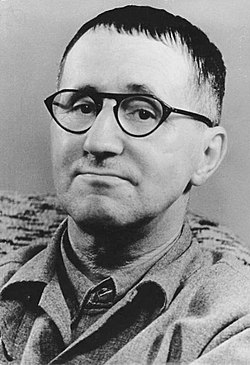Bertolt Brecht Quote
Today every invention is received with a cry of triumph which soon turns into a cry of fear.
Bertolt Brecht
Today every invention is received with a cry of triumph which soon turns into a cry of fear.
Tags:
progress
Related Quotes
Every great athlete, artist and aspiring being has a great team to help them flourish and succeed - personally and professionally. Even the so-called 'solo star' has a strong supporting cast helping t...
Rasheed Ogunlaru
Tags:
artists, athlete, athletic, business, coaching, creative process, creativity, enterprise, entrepreneurship, fame
One of the difficulties in raising public concern over the very severe threats of global warming is that 40 percent of the US population does not see why it is a problem, since Christ is returning in...
Noam Chomsky
Tags:
advancement, apocalypse, atheism, bible, climate, climate change, consensus, deism, global warming, ignorance
About Bertolt Brecht
Eugen Berthold Friedrich Brecht (10 February 1898 – 14 August 1956), known as Bertolt Brecht and Bert Brecht, was a German theatre practitioner, playwright, and poet. Coming of age during the Weimar Republic, he had his first successes as a playwright in Munich and moved to Berlin in 1924, where he wrote The Threepenny Opera with Elisabeth Hauptmann and Kurt Weill and began a life-long collaboration with the composer Hanns Eisler. Immersed in Marxist thought during this period, Brecht wrote didactic Lehrstücke and became a leading theoretician of epic theatre (which he later preferred to call "dialectical theatre") and the Verfremdungseffekt.
When the Nazis came to power in Germany in 1933, Brecht fled his home country, initially to Scandinavia. During World War II he moved to Southern California where he established himself as a screenwriter, while also being surveilled by the FBI. In 1947, he was part of the first group of Hollywood film artists to be subpoenaed by the House Un-American Activities Committee for alleged Communist Party affiliations. The day after testifying, he returned to Europe, eventually settling in East Berlin where he co-founded the theatre company Berliner Ensemble with his wife and long-time collaborator, actress Helene Weigel.
When the Nazis came to power in Germany in 1933, Brecht fled his home country, initially to Scandinavia. During World War II he moved to Southern California where he established himself as a screenwriter, while also being surveilled by the FBI. In 1947, he was part of the first group of Hollywood film artists to be subpoenaed by the House Un-American Activities Committee for alleged Communist Party affiliations. The day after testifying, he returned to Europe, eventually settling in East Berlin where he co-founded the theatre company Berliner Ensemble with his wife and long-time collaborator, actress Helene Weigel.
